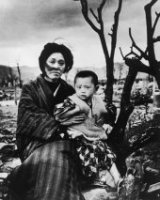I hear the roar of thunder, a mournful wail
Sing a song of awesome wonder in the light many dead
I see my blue dome floating on a treeless sky
I see obasan [1] weeping with no tears left to cry
And in my hour of darkness no saviour did appear
I call to you, Hiroshima
Hiroshima mon amour
Hiroshima, Hiroshima mon amour
Well, I woke up in the mornin' and pollution fill the air
I hear sounds of people run like mice to catch their share
I see cities crumble like castles made of sand
I can feel the eathquake rumble, jitter through the land
And in my hour of darkness no saviour did appear
I call to you, Hiroshima
Hiroshima mon amour
Hiroshima, Hiroshima mon amour
I wandered from Nagoya, Nagasaki in the rain
Drinkin' sake in Sapporo, just tryin' to drown the pain
Arashiyama mountain by the lake at Hokkaido
I'm the bukyo [2] dancin' empty on the street of old Kyoto
And in my hour of darkness no saviour did appear
I call to you, Hiroshima
Hiroshima mon amour
Hiroshima, Hiroshima mon amour
Sing a song of awesome wonder in the light many dead
I see my blue dome floating on a treeless sky
I see obasan [1] weeping with no tears left to cry
And in my hour of darkness no saviour did appear
I call to you, Hiroshima
Hiroshima mon amour
Hiroshima, Hiroshima mon amour
Well, I woke up in the mornin' and pollution fill the air
I hear sounds of people run like mice to catch their share
I see cities crumble like castles made of sand
I can feel the eathquake rumble, jitter through the land
And in my hour of darkness no saviour did appear
I call to you, Hiroshima
Hiroshima mon amour
Hiroshima, Hiroshima mon amour
I wandered from Nagoya, Nagasaki in the rain
Drinkin' sake in Sapporo, just tryin' to drown the pain
Arashiyama mountain by the lake at Hokkaido
I'm the bukyo [2] dancin' empty on the street of old Kyoto
And in my hour of darkness no saviour did appear
I call to you, Hiroshima
Hiroshima mon amour
Hiroshima, Hiroshima mon amour
Due parole in giapponese:
[1] obasan: zia, donna attempata
[2] bukyo: parola poco usata(武教) in cui il primo ideogramma significa guerriero e il secondo significa insegnamento nel senso di dottrina: “insegnamento del bushidō (la via del samurai)”. Forse usata al posto di bhikkhu, monaco della tradizione buddista theravāda, che però non è giapponese.
[1] obasan: zia, donna attempata
[2] bukyo: parola poco usata(武教) in cui il primo ideogramma significa guerriero e il secondo significa insegnamento nel senso di dottrina: “insegnamento del bushidō (la via del samurai)”. Forse usata al posto di bhikkhu, monaco della tradizione buddista theravāda, che però non è giapponese.
envoyé par Piersante Sestini - 29/6/2023 - 23:06
×
![]()







Non credo ci sia bisogno di sottolineare il tema.
Per non dimenticare.
Incisa nel 1979 per Better Days Records alla Nippon Columbia di Tokyo da Rowan & Greene & The Red Hot Peppers (Richard Greene violino, Tony Trischka banjo, Andy Statman mandolino e Roger Mason basso, oltre ovviamente a Rowan alla chitarra e voce) e ripubblicata in seguito in diverse raccolte.